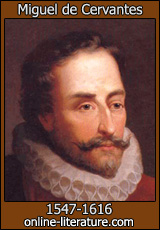 Subscribe for ad free access & additional features for teachers. Authors: 267, Books: 3,607, Poems & Short Stories: 4,435, Forum Members: 71,154, Forum Posts: 1,238,602, Quizzes: 344
Subscribe for ad free access & additional features for teachers. Authors: 267, Books: 3,607, Poems & Short Stories: 4,435, Forum Members: 71,154, Forum Posts: 1,238,602, Quizzes: 344
Summary Chapter 76
One of the original translators of Don Quixote expresses his doubt about whether the account that Don Quixote gave of what happened in the Cave of Montesinos is true. He doesn't believe Quixote lied, but he doubts it is true--though he believes all prior advenutres happened as told.
The cousin is shocked by how boldly Sancho insults his master. He figures Quixote must be in a good mood to not react to his squire's insolence. The cousin considers himself blessed in his acquaintance of Don Quixote, for he has learned what the Cave of Montesinos contains and about the antiquity of cards, which will be useful to him. Quixote expresses doubt about how many people he can dedicate his books to, but the cousin says there are a few.
They come across a man on the road carrying arms. He tells them he cannot stop, but they will see him at an inn if they stop there. There are some curious things he can tell them.
They continue on the road to the inn and come across a youth. Don Quixote asks where he is going, since he is traveling lightly. The youth replies it is hot, and he is poor—that is why he travels lightly. He is going to war. He plans to catch up with the infantry so he can enlist. He is tired of working for stingy masters. Don Quixote comments that the life of a soldier is a noble one. You win honor. He invites the boy to ride and dine with him. The page accepts the invitation to dine but prefers to walk.
Sancho is glad that Quixote doesn’t mistake the inn for a castle when they arrive there.
| Art of Worldly Wisdom Daily In the 1600s, Balthasar Gracian, a jesuit priest wrote 300 aphorisms on living life called "The Art of Worldly Wisdom." Join our newsletter below and read them all, one at a time. |
Sonnet-a-Day Newsletter Shakespeare wrote over 150 sonnets! Join our Sonnet-A-Day Newsletter and read them all, one at a time. |
